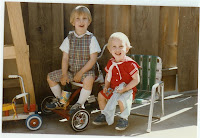| Walking on bumpy walking track |
You see people always follow you closely when you get on a bus here; you pretty much have to push or get pushed on. Your other option is to get on last which is what I usually do, but I happened to be in the middle of a bunch of people this time, so that wasn't an option. This still isn't explaining the man with the sword though, is it?
He was a tall (for here), older gentleman, grandly arrayed in colorful silk. He was followed closely by a petite older lady (who I assume is his wife), who was also dressed in silk and carrying a large sword. But the part that I have been leaving out is that the swords are fake, completely harmless, like toys for big kids or stage props. Things quite often here aren't what they seem to be at first glance. You can see people everyday in the public parks using swords to practice their Tai Chi (dǎ tài jí quán, 打太极拳). I am pretty sure most of them couldn't hurt anyone, even if they were trying really hard.
The tai chi (tài jí quán, 太极拳) they practice here is not at all how I pictured this "martial art." Sure they use sword as props, but just as the swords and older people are harmless, so are the actions of tai chi (tài jí quán, 太极拳). It is mostly slow, small, stretching movements. They also walk on paths, sometimes barefoot on bumpy rocks.
In fact the practice that seems most dangerous about this group of exercises is when those who performing tai chi hit themselves. It can be a little alarming at first to see older people hitting themselves all over, mostly their arms and legs, but sometimes even their heads. However, they aren't really trying to hurt themselves, at least I don't think they are. I believe they view it as a massage and a way to increase their blood flow.
So don't be to alarmed if you are walking down the streets in town and see people carrying swords or hitting themselves; things are not always how they seem. It is important to remember that as someone who grew up in a different culture, things often have different meanings when properly interpreted in their own culture.


